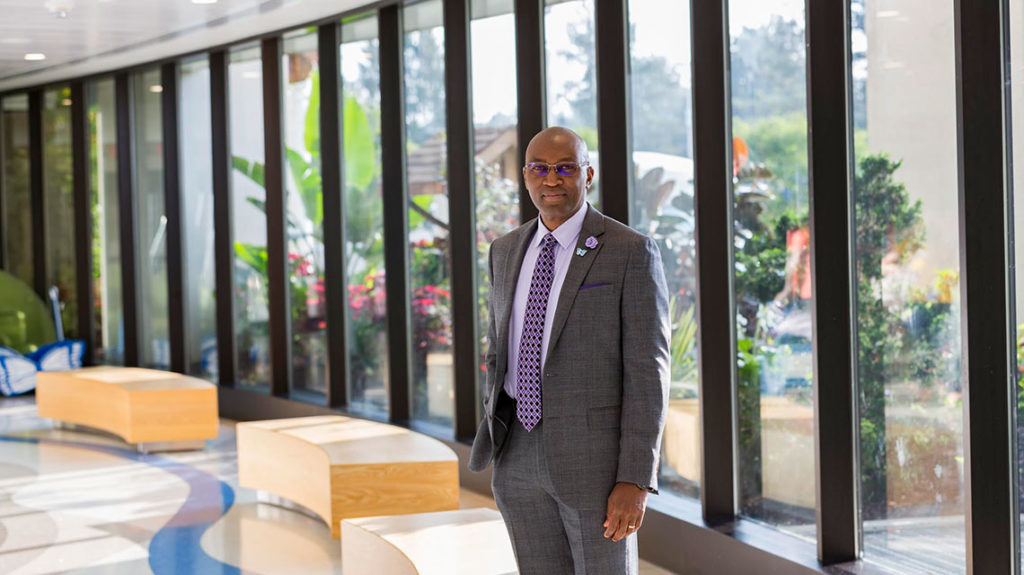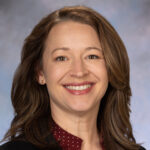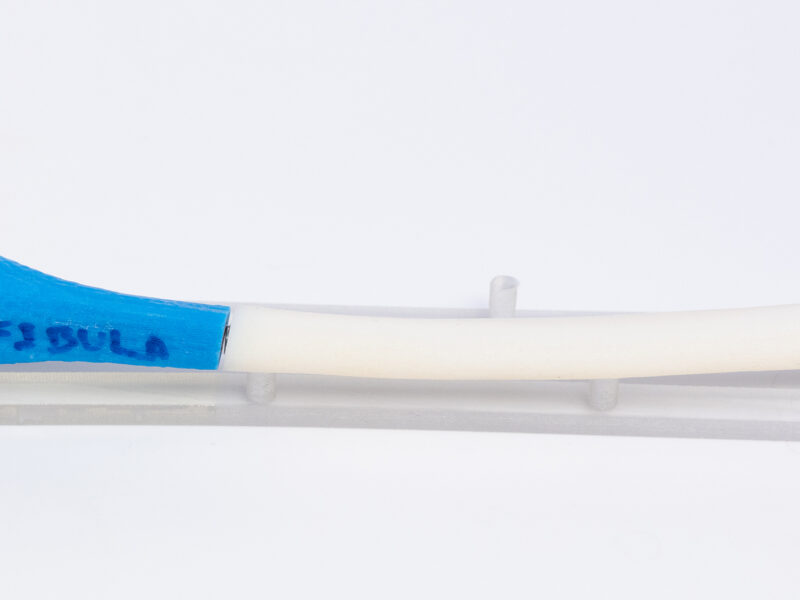Meet Oluyinka Olutoye, MD, PhD
Meet Oluyinka Olutoye, MD, PhD https://pediatricsnationwide.org/wp-content/uploads/2019/10/080719ds2389-web-1024x575.jpg 1024 575 Abbie Miller Abbie Miller https://pediatricsnationwide.org/wp-content/uploads/2023/05/051023BT016-Abbie-Crop.jpg- October 10, 2019
- Abbie Miller

In August 2019, Nationwide Children’s welcomed Oluyinka Olutoye, MD, PhD, as surgeon-in-chief. In a Q&A, the internationally renowned fetal surgeon shares his thoughts about the past, present and future of fetal surgery and the challenges and opportunities facing pediatric surgeons today.
Q: What brought you to Nationwide Children’s Hospital?
I was initially attracted to the strength of the existing surgery services at Nationwide Children’s and was further intrigued by the organization’s desire to expand in breadth, depth, service access and reputation. I was impressed by the hospital’s collaborative culture and its universal commitment to exceptional patient care, as well as its outcomes-driven model of high quality and safe care delivery. These elements, coupled with the organization’s focus on discovery and innovation in pediatric research and educational excellence led me to join this team.
I am excited to now have the opportunity to help shape and establish a new bar for pediatric surgical services across the nation and beyond. This was the right time for this position in many ways, as these goals aligned directly with my personal desire for a new challenge and the opportunity to leave a lasting legacy in my profession.
Q: What are the biggest challenges or opportunities facing pediatric surgeons now?
With continued advances in children’s surgery, we know more and we can diagnose more. But we also have to think about conditions and ailments that we have not yet considered. We have to approach our surgical practice through a holistic perspective of care, for example, by considering the impact of social determinants of health not only on treatment strategies but also on overall patient outcomes.
Our challenge now is to provide better access for our patients, develop multidisciplinary programs that can meet the medical and psychosocial needs of our patients in one setting, approach clinical diagnosis and care delivery with quality and safety at the forefront, and emphasize a values-driven model of care that puts the patient and family squarely in the center of our care paradigm. Equally important, we must be prepared to both model and cultivate for our learners, the standards of professionalism, intellectual curiosity and versatility that will be required for effective clinical practice in the future.
Q: What inspired you to specialize in fetal surgery?
My interest in fetal surgery began in high school, when I read a book by Christian Barnard – the first surgeon to perform a human-to-human heart transplant. I was especially intrigued by his earlier research where he and his colleagues sought to find out why some babies were born with intestinal anomalies (atresias). They performed surgery on fetal animals to recreate those anomalies. That was when I was first exposed to the idea that one could perform surgery on a fetus.
While I was always interested in medicine, one aspect that especially captured my interest was embryology – how the embryo develops and all the anomalies that can happen during development. This interest led me toward surgery and pediatric surgery. As a pediatric surgeon, I focused on the question “what if we didn’t have to wait until the fetus is born to do something about their anomaly?” The mother’s womb is the best intensive care unit there is, and by conducting corrective surgeries in the fetus while in the womb, we can help to change the trajectory of the baby’s outcome in life.
Q: What excites you most about the future of fetal surgery?
Initially, fetal surgery was reserved for conditions where the fetus was either expected to die or predicted to have severe morbidity at birth but the outcomes could potentially be improved with intervention. Fetal surgery was only offered in those rare and severe cases where the potential fetal benefit outweighed the risk to the mother.
Over time, advances in the field have lowered the risk to the mother. These advances include miniaturization of instruments, better imaging technology and minimal uterine access. As the risks are reduced, it opens up many more opportunities to address other anomalies before birth. Furthermore, advances in genomics, gene and cell-based therapy offer other opportunities for non-surgical approaches to fetal maladies.
Things that would have been totally unreasonable to consider 10 to 15 years ago are now on the table. As the opportunity to help increases, so too does the responsibility to help. The fetal care landscape is broadening, and that’s exciting.
Q: What do you hope to bring to your new role as surgeon-in-chief at Nationwide Children’s?
I look forward to building on the exceptional work that has already been done at Nationwide Children’s Hospital. There are strong clinical programs in place, with tremendous achievements in patient care, safety, quality and health outcomes. I hope to bring a collaborative leadership style, a spirit of excellence, a tireless dedication to best-outcomes, and to share a vision for transformative and sustainable growth as we move from excellence to preeminence.
About the author
Abbie (Roth) Miller, MWC, is a passionate communicator of science. As the manager, medical and science content, at Nationwide Children’s Hospital, she shares stories about innovative research and discovery with audiences ranging from parents to preeminent researchers and leaders. Before coming to Nationwide Children’s, Abbie used her communication skills to engage audiences with a wide variety of science topics. She is a Medical Writer Certified®, credentialed by the American Medical Writers Association.
- Abbie Millerhttps://pediatricsnationwide.org/author/abbie-miller/
- Abbie Millerhttps://pediatricsnationwide.org/author/abbie-miller/
- Abbie Millerhttps://pediatricsnationwide.org/author/abbie-miller/
- Abbie Millerhttps://pediatricsnationwide.org/author/abbie-miller/
- Posted In:
- Features
- Second Opinions







